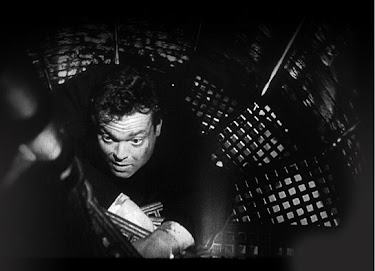Written by: Dashiell Hammett (novel), Jonathan Latimer (screenplay)
Starring: Alan Ladd, Brian Donlevy, Veronica Lake, Bonita Granville, Richard Denning, Joseph Calleia, William Bendix, Frances Gifford, Donald MacBride, Moroni Olsen
In the early 1940s, the unofficial film noir style was only just beginning to find its feet, and much of its inspiration, at least plot-wise, was to be found in the hard-boiled detective novels of authors like Raymond Chandler and Dashiell Hammett {whose best-known creations are probably Sam Spade and Nick and Nora Charles}. "The Glass Key" was originally published by Hammett in 1931, and was first adapted to film by Frank Tuttle in 1935, with George Raft in the main role. Seven years later, director Stuart Heisler brought the story into the 1940s with his slick, professional tale of nasty political scheming. Very few punches are pulled, and many characters get well and truly "beat up," but the film itself seems somewhat dispensable at the end of the day. The oddball characters are intriguing without being memorable, their surfaces only scratched as far as the complicated plot requires; likewise, the performances themselves are worthwhile, if not altogether convincing. All things considered, The Glass Key (1942) is a solid film noir, but not a timeless one.
 When political boss Paul Madvig (Brian Donlevy) decides to back reform candidate Ralph Henry (Moroni Olsen), he stirs up the anger of crime boss Nick Varna (Joseph Calleia), who will be crippled by the partnership. When Henry's meddlesome son (Richard Denning) is found murdered, everybody suspects Madvig of the crime, including the victim's beautiful sister Janet Henry (Veronica Lake). It falls to Madvig's hard-edged assistant Ed Beaumont (Alan Ladd) to sort out the truth of the matter, and to ensure that Varna's gang doesn't succeed in snuffing out Madvig's candidate from the political ballot. Ladd is curiously uneven in the main role. Though he courageously takes multiple beatings with a blood-tinged grin, and talks his way through swathes of lethal encounters, it is the unnecessary romantic moments that bring him down. Whenever he meets Janet Henry, Ladd suddenly acquires this curious lopsided smirk that makes him look weak and uncomfortable – it's hardly the expression of a man who's almost always in control of the situation.
When political boss Paul Madvig (Brian Donlevy) decides to back reform candidate Ralph Henry (Moroni Olsen), he stirs up the anger of crime boss Nick Varna (Joseph Calleia), who will be crippled by the partnership. When Henry's meddlesome son (Richard Denning) is found murdered, everybody suspects Madvig of the crime, including the victim's beautiful sister Janet Henry (Veronica Lake). It falls to Madvig's hard-edged assistant Ed Beaumont (Alan Ladd) to sort out the truth of the matter, and to ensure that Varna's gang doesn't succeed in snuffing out Madvig's candidate from the political ballot. Ladd is curiously uneven in the main role. Though he courageously takes multiple beatings with a blood-tinged grin, and talks his way through swathes of lethal encounters, it is the unnecessary romantic moments that bring him down. Whenever he meets Janet Henry, Ladd suddenly acquires this curious lopsided smirk that makes him look weak and uncomfortable – it's hardly the expression of a man who's almost always in control of the situation. Veronica Lake plays her role with a resolute passiveness that gives her character an air of innocence. However, as any good femme fatale should, her apparent inaction radiates a very subtle suggestion of menace, implying that Beaumont would do well to keep a peripheral eye on her movements. Donlevy is assuredly smug and confident as the political man who never loses face ("I just met the swellest dame... she smacked me in the kisser!"), and Calleia is suitably ominous as his sworn opponent. Unusually violent for a 1940s film, The Glass Key features men being thrown through windows, men throwing themselves out of windows and Alan Ladd being beaten within an inch of his life (courtesy of William Bendix, whose sadistic pleasure in inflicting pain is almost frightening). Heisler's film was reportedly an inspiration for Akira Kurosawa's Yojimbo (1961), though I more readily noticed parallels with the Coen brothers' Miller's Crossing (1990), in which Gabriel Byrne becomes estranged from his crime partner but nonetheless takes innumerable beatings for him.
Veronica Lake plays her role with a resolute passiveness that gives her character an air of innocence. However, as any good femme fatale should, her apparent inaction radiates a very subtle suggestion of menace, implying that Beaumont would do well to keep a peripheral eye on her movements. Donlevy is assuredly smug and confident as the political man who never loses face ("I just met the swellest dame... she smacked me in the kisser!"), and Calleia is suitably ominous as his sworn opponent. Unusually violent for a 1940s film, The Glass Key features men being thrown through windows, men throwing themselves out of windows and Alan Ladd being beaten within an inch of his life (courtesy of William Bendix, whose sadistic pleasure in inflicting pain is almost frightening). Heisler's film was reportedly an inspiration for Akira Kurosawa's Yojimbo (1961), though I more readily noticed parallels with the Coen brothers' Miller's Crossing (1990), in which Gabriel Byrne becomes estranged from his crime partner but nonetheless takes innumerable beatings for him.7/10
Currently my #4 film of 1942:
1) Casablanca (Michael Curtiz)
2) To Be or Not to Be (Ernst Lubitsch)
3) The Major and the Minor (Billy Wilder)
4) The Glass Key (Stuart Heisler) *
5) The Magnificent Ambersons (Orson Welles)





_poster.jpg)


No comments:
Post a Comment